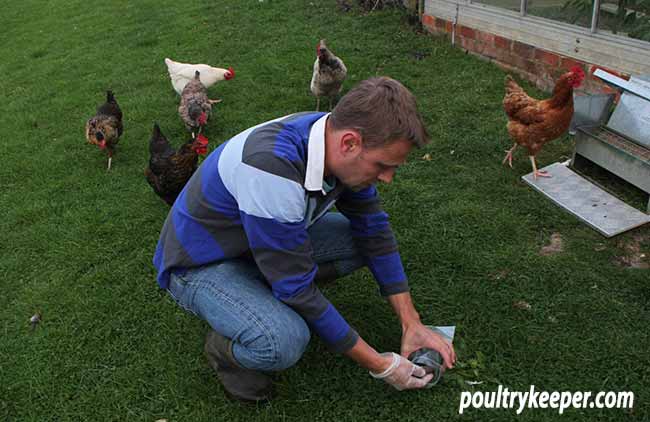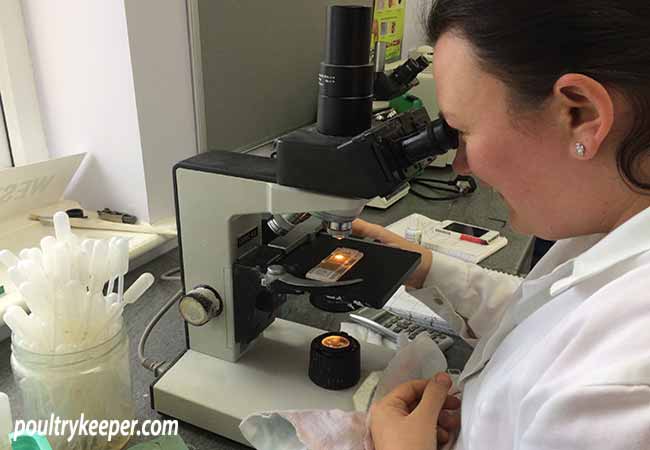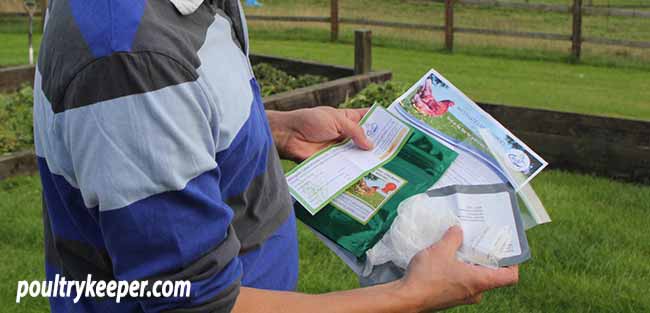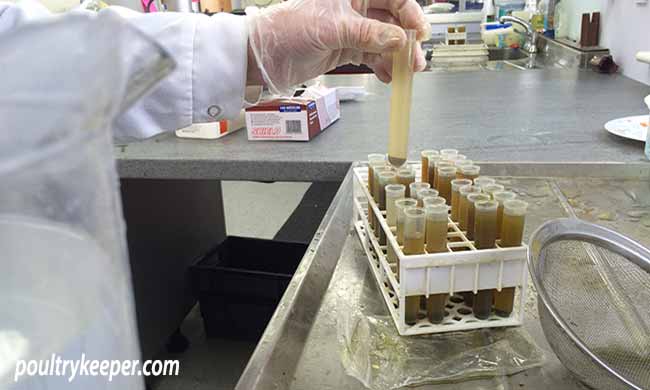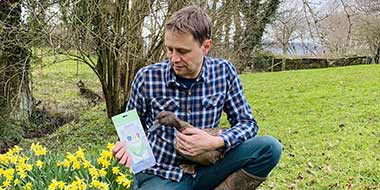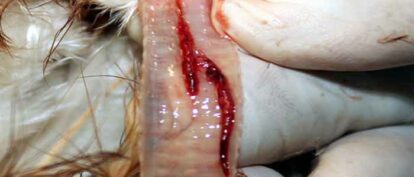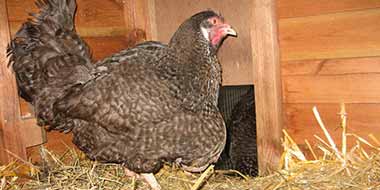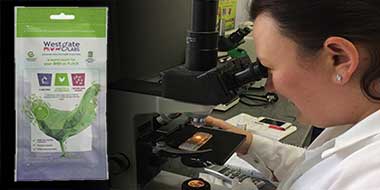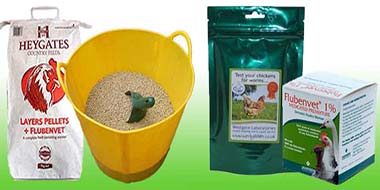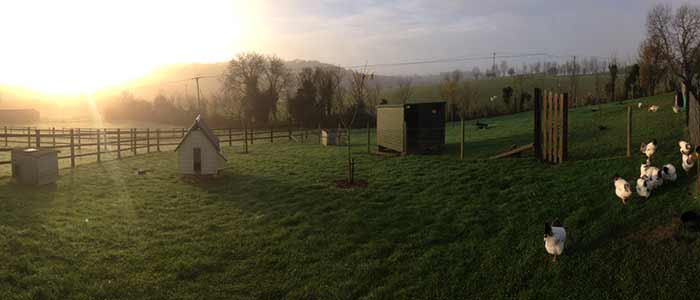
The Spring rise
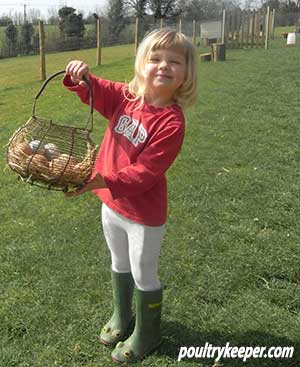
We all look forward to spring (I certainly do). More light, more eggs and the best time for fertility and breeding, but let’s face it, even the local Sparrow population is laying during the spring, so your hens should be laying now (earning their keep, I say), as nature intended.
Even if you keep some rather fancy fowls that don’t lay so many eggs, they should be at the peak of their production now. Springtime worming is usually the last thing on my mind!
Worm numbers increase during spring
There is something else going on at this time of year though, something most of us would instead not think about when we have fit and healthy birds and thoughts of how many eggs we are going to hatch in our incubator.
In the commercial sector, this has been called “The Spring Rise” which is when poultry worms start to increase in numbers as the temperature holds above 10°C. This increased ‘infection pressure’ from internal parasites can cause your birds to become ill as their worm burden dramatically increases and you may need to think about springtime worming.
Worm eggs cannot mature in:
- A very dry atmosphere. They need some humidity to develop.
- At temperatures below 10°C. They will lie dormant in cool temperatures.
- At temperatures above 34°C. They will start to die off at high temperature.
- In the absence of oxygen. They need this to start development.
So, warm, humid spring days are perfect for worm eggs to mature and be picked up either directly (from the ground) by your hens or indirectly (via an intermediate host such as earthworms) that’s eaten by your hens.
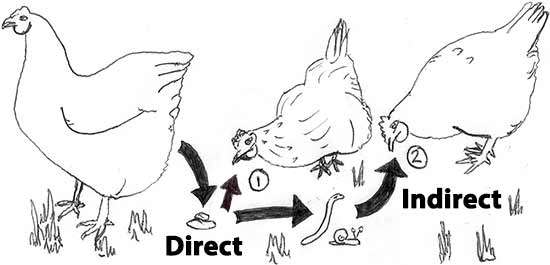
The three main types of worms
The three main worms that cause problems in chickens are Roundworms, Hairworms and Caecal worms, and I’ll spare you the Latin names, but all three can cause quite a bit of damage to your chickens given their small size.
The first, Roundworms are the most common and thankfully are the biggest so are usually spotted in faeces. They are white and can grow up to two inches long.
The second main worm, Hairworms are, as the name suggests, incredibly thin and are barely visible to the naked eye.
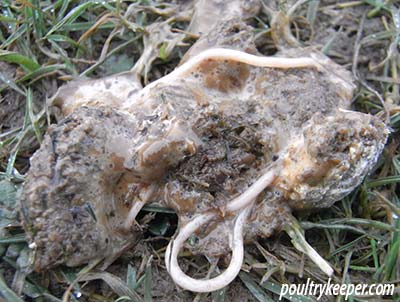
Caecal worms live in the lower end of the gut and commonly cause no apparent harm. They can, however, carry a parasite called Histomonas, which is the cause of Blackhead, a big worry if you keep Turkeys.
For this reason that it’s not advisable to keep chickens on the same ground as Turkeys, although it can be done if you follow a strict worm testing regime and if required, springtime worming.
Springtime worming: What else can help?
The excellent news is worm eggs (which, of course, can be picked up and add to the worm burden) are destroyed by prolonged and deep frost in the winter, drought in the summer and ultra-violet (UV) radiation from sunshine.
We can’t do much about the weather. A mild winter and a wet spring are more common these days. What we can do, though, is to keep the grass trimmed short so that when we do get some sunshine, the UV light can get to droppings and destroy worm eggs.
Clean pasture
Rotating pasture and not putting young stock onto the ground where there are older birds can also help prevent chickens from picking up worm eggs.
We can also move chickens around if they are in a portable run or walk their fixed house to a new location in the garden from time to time to help lessen the worm burden.
If you are raising chicks, do not put them on the same ground as the adult stock. Rest it for at least a couple of weeks. Generally speaking, moving animals onto fresh pasture is just good husbandry, and you will notice farmers moving cattle and sheep around for the same reason.
These things can help without a doubt. However, if you have a flock that’s been on the same patch of ground for a long time, you’re going to be hard-pressed to win. If you haven’t wormed your chickens by the start of spring, it’s a good idea to consider your options now because worm eggs that are deposited in droppings by the thousand can now start to mature.
Tip: How to worm chickens
If you see worms (worming chickens has some photos) or you've had the recommendation to worm after a positive worm count, then the only licensed in feed wormer (in the UK) is Flubenvet.
Flubenvet is simple to use, mix 2Kg of food per blue scoop that comes in the pack. One pack can treat 20 average-sized hens.
An alternative to this that's even easier is to use a sack of pre-mixed layers pellets containing Flubenvet available online, or at your local feed store.
If you're not sure if you need to worm, then READ ON!
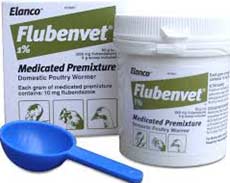
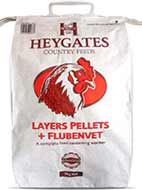
Test for worms
For many years, the spring and autumn were times that chicken keepers would routinely worm their chickens with Flubenvet. But as Bob Dylan sang in 1964 “The times, they are a-changin’…“
It is good practice and accepted by the Veterinary community these days that before routinely worming chickens, we should test to see whether they need worming first. If not, the overuse of wormers builds up resistance in poultry, just like the antibiotic resistance problems we hear about.
For backyard poultry keepers, getting a worm count done by a vet used to be costly, paying what was close to £50 when Flubenvet relatively speaking was so cheap.
A quick history lesson
Janssen Animal Health (the company that supplied Flubenvet) became Elanco, and there were significant price increases. I can also remember years when there was a production shortage of Flubenvet.
Additional legislation on the suppliers who needed to pay a fee and become suitably qualified increased the cost further.
Going Forwards
On the opposite end of the scale, worm count kits are now available to buy on Amazon (UK) for £14 and can be sent off by post, with the results coming back by email a few days later.
So far, over the last few years, I’ve not needed to use Flubenvet.
Getting A
Worm Count
Using a worm count kit is relatively straightforward. There are gloves, a collection bag for samples and a pre-paid envelope. The worm count takes place in a lab under a microscope and the result is returned by email advising you of the number of eggs and whether you need to worm your chickens.
